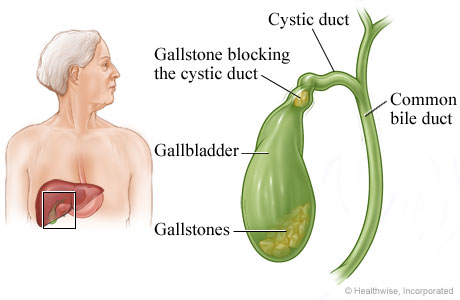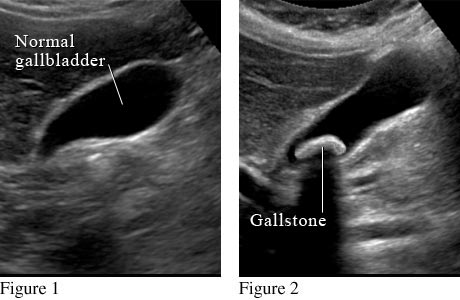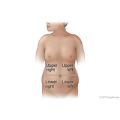Condition Basics
What are gallstones?
Gallstones are stones that form in the gallbladder. The gallbladder is a small sac located just under the liver. It stores bile released by the liver. Bile helps you digest fats. Gallstones can be smaller than a grain of sand or as large as a golf ball.
Gallstones form when cholesterol and other things found in bile make stones. They can also form if the gallbladder doesn't empty as it should.
Gallstones can also form in the common bile duct or cystic duct. These tubes carry bile from the gallbladder and the liver to the small intestine.
What causes them?
Gallstones form when cholesterol and other substances found in bile make stones. They can also form if the gallbladder doesn't empty as it should. People who are overweight or who are trying to lose weight quickly are more likely to get gallstones.
What are the symptoms?
Most people who have gallstones don't have symptoms. If you have symptoms, you likely will have pain in your stomach or the upper right part of your belly. Pain may spread to your right upper back or shoulder blade area. When gallstones block a bile duct, you may have pain with fever and chills.
How are they diagnosed?
Your doctor will do a physical examination and ask you questions about when the pain in your belly started, where it is, and if it comes and goes or is always there. If your doctor thinks you have gallstones, he or she may order an ultrasound of the belly to confirm the diagnosis.
How are gallstones treated?
If you don't have symptoms, you probably don't need treatment. If your first gallstone attack causes pain, your doctor may tell you to take pain medicine and wait to see if the pain goes away. If you have more attacks, you may want to have your gallbladder removed.
How can you prevent them?
There is no sure way to prevent gallstones. But you can reduce your risk of forming gallstones that can cause symptoms.
- Stay at a healthy weight. If you need to lose weight, do so slowly and sensibly.
- Eat regular, balanced meals.
- Be active, and exercise regularly.
Health Tools
Health Tools help you make wise health decisions or take action to improve your health.
Cause

Gallstones develop when cholesterol and other substances in the bile form crystals that become hard stones in the gallbladder. The gallbladder is a small sac located just under the liver. Gallstones can form when too much cholesterol is in the bile or when the gallbladder does not empty properly.
What Increases Your Risk
Your chances of forming gallstones that can cause symptoms are higher if you:
- Are female. Females are twice as likely as males to have gallstones.
- Are older than 55.
- Are Indigenous or Hispanic.
- Have a family history of gallstones.
You may also be increasing your risk for gallstones if you:
- Are overweight.
- Lose weight rapidly or lose weight by dieting and then gain weight back again.
- Are pregnant.
- Are taking estrogen (after menopause) or high-dose birth control pills.
- Get very little or no exercise.
- Do not eat for a period of time (fast).
Symptoms
Most people who have gallstones don't have symptoms. When symptoms occur, they can include:
- Pain in the pit of your stomach or in the upper right part of your belly. It may spread to your right upper back or shoulder blade area.
- Pain that may come and go or be steady. It may get worse when you eat.
- Fever and chills, if a gallstone is blocking a bile duct and causing an infection.
- Yellowing of your skin and the whites of your eyes.
Pain can last 15 minutes to 24 hours. Continuous pain for 1 to 5 hours is common. The pain may begin at night and be severe enough to wake you. Pain often starts after eating food that is high in fat. The pain usually makes it hard to get comfortable. Moving around doesn't make the pain go away.
What Happens
The progression of gallstones depends on whether you have symptoms. Most people with gallstones have no symptoms and do not need treatment.
The most common problem caused by gallstones occurs when a gallstone blocks the cystic duct that drains the gallbladder. It often causes bouts of pain that come and go as the gallbladder contracts and expands. The bouts of pain are often severe and steady. The pain can last from 15 minutes to up to 6 hours. And the pain may get worse after a meal. Symptoms usually improve within a few days.
If the pain is severe or if you have had gallbladder pain before, you may need to have your gallbladder removed.
In rare cases, gallstones can cause pancreatitis, an inflammation of the pancreas. Gallstones back up the flow of digestive enzymes made by the pancreas. Pancreatitis may cause sudden, severe belly pain, loss of appetite, nausea and vomiting, and fever.
Learn more
When to Call
Call 9-1-1 or other emergency services immediately if you:
- Have sudden or severe abdominal pain.
- Have trouble breathing.
- Faint or lose consciousness.
Call your doctor now if you have:
- Pain that may be caused by gallstones (continuous moderate to severe pain in the upper right abdomen) along with a fever and chills that are clearly not caused by a stomach infection or any other reason.
- Pain in the upper midsection or upper right abdomen, along with a yellow tint to your skin and the white part of your eyes, dark yellow-brown urine, or light-coloured stools.
- Diabetes or an impaired immune system and you have symptoms that may be caused by gallstones.
If you have symptoms of gallstones but no fever, chills, or yellowing of your skin or the white part of your eyes, you may still need to be checked and treated. Schedule an appointment with your doctor.
Watchful waiting
Watchful waiting means taking a wait-and-see approach. You and your doctor watch your symptoms or condition to see if you need treatment. It's often the first approach to a first attack of gallstone pain.
Check your symptoms
Examinations and Tests
Most people who have gallstones don't know it because they don't have symptoms.
If you have symptoms, your doctor will do a physical examination. He or she will ask you questions about when the pain in your belly started, where it is, and if it comes and goes or is always there. If your doctor thinks you have gallstones, your doctor may order tests to confirm the diagnosis. Tests might include:
- An abdominal ultrasound. This is the best way to confirm gallstones. A technologist moves a wand across your belly to create pictures on a screen.
- A gallbladder scan. Your doctor may do this if your ultrasound didn't show gallstones. In this test, a special dye is injected into a vein in your arm.
- An endoscopic retrograde cholangiopancreatogram (ERCP). This test checks the tubes (ducts) that drain the liver, gallbladder, and pancreas. A flexible, lighted scope (endoscope) and X-ray pictures are used.
What a gallstone looks like on an abdominal ultrasound

Courtesy of Intermountain Medical Imaging, Boise, Idaho.
Figure 1 shows a normal gallbladder on ultrasound. Figure 2 shows a large gallstone in the gallbladder.
Learn more
Treatment Overview
If you don't have symptoms, you probably don't need treatment.
If you do have symptoms and your first gallstone attack causes pain, your doctor may tell you to take pain medicine and wait to see if the pain goes away. You may never have another attack. Waiting to see what happens usually won't cause problems.
If you have a second attack, you may want to have your gallbladder removed. A second attack means you're more likely to have future attacks. Many people have their gallbladders removed. And the body works fine without a gallbladder.
Learn more
Self-Care
- Rest until you feel better.
- Be safe with medicines. Read and follow all instructions on the label.
- If the doctor gave you a prescription medicine for pain, take it as prescribed.
- If you are not taking a prescription pain medicine, ask your doctor if you can take an over-the-counter medicine.
- Avoid foods that cause symptoms, especially fatty foods. These can make the gallbladder tighten and cause pain.
Surgery
Surgery to remove the gallbladder (cholecystectomy) is the treatment of choice for gallstones that cause moderate to severe pain or other symptoms. Symptoms usually don't return after the gallbladder is removed. If you have certain health problems, surgery may also be done even if you don't have symptoms. In a small number of cases, surgery may be done to prevent other problems from gallstones.
Laparoscopic surgery is the most common way to remove the gallbladder. A doctor puts a lighted viewing tool and surgical tools into your belly through several small cuts. People who have this surgery usually recover in about 1 week.
Open surgery involves one larger cut. The gallbladder is removed through this cut. It may be done if laparoscopic surgery isn't an option. Or it may be done when other problems are found during laparoscopic surgery. This type of surgery requires a longer recovery period. It also causes more pain.
Learn more
Related Information
Credits
Current as of: March 22, 2023
Author: Healthwise Staff
Medical Review:
E. Gregory Thompson MD - Internal Medicine
Adam Husney MD - Family Medicine
Kathleen Romito MD - Family Medicine
Arvydas D. Vanagunas MD - Gastroenterology
Current as of: March 22, 2023
Author: Healthwise Staff
Medical Review:E. Gregory Thompson MD - Internal Medicine & Adam Husney MD - Family Medicine & Kathleen Romito MD - Family Medicine & Arvydas D. Vanagunas MD - Gastroenterology



